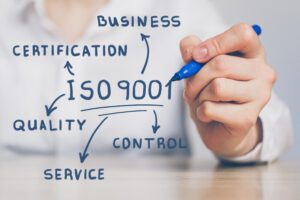For years on end employees working at their various companies have been lectured by seniors with the rather mainstream and negative opinion of an auditor. There is a common misconception that auditors look to expose the weaknesses of operation within a company, and whilst finding weaknesses is one aspect of the job, there is more to the picture that makes up an auditor’s value.
As a trainee consultant from Assent Risk Management, I am going to share with you my observations on an ISO 9001 audit. I aim to demystify the area of ISO 9001 Quality Management systems auditing and reveal that quality auditors can provide an accommodating approach during auditing, one in which employees are given support and flexibility, to ensure the process is as smooth and stress-free as possible.
For companies wanting to attain ISO 9001 Certification, they will be required to pass an external audit of their management systems with a certification body. Assent provides valuable support for companies, preparing them for certification and ensuring the process runs smoothly. The consultants of Assent help implement quality management systems and test them through internal audits to give the client a better idea about their systems.
For the average employee this, sometimes lengthy, the process can seem daunting and overwhelming but the Consultants of Assent have an approach that is of high quality, accommodating and friendly.
From my observations of a recent remote audit for ISO 9001, I would like to share some key takeaways that I learned during the audit.
Opening Meeting
It is the morning of day one after a quick ice breaker with the client’s, the process is explained and the ISO 9001 clauses have started to be audited against the management system from understanding the context of the organisation to planning for opportunities.
During the afternoon session evidence is beginning to be gathered and interviews have started.
Whilst some interviewees are confident others are not so much which is where the first takeaway lesson comes from.
Consults should use their soft skills to adapt the way they interact with the clients employees, this can include reframing questions, coming back at a later time or giving reassurances as to why the auditor needs to ask the question.
Non-Disruptive Approach to ISO 9001
The second takeaway is to understand that the client has a fully working business to run and being flexible in the way you take interviews and evidence collection is key to ensuring the process runs smoothly. For example, give the person you want information from flexibility in when they can speak with you during your audit.
Integrity & Honesty
The final takeaway I learned was to show integrity and honesty. This may be a core function of any quality auditor as it is relevant for any field of auditing and any area of professional life. The client needs to be able to trust the consult and consultancy to prepare them for certification.
These are three qualities of an auditor that are not often talked about but can be pivotal in auditing. I hope to provide value and if you or your company are interested in attaining ISO standards feel free to contact Assent Risk Management.


